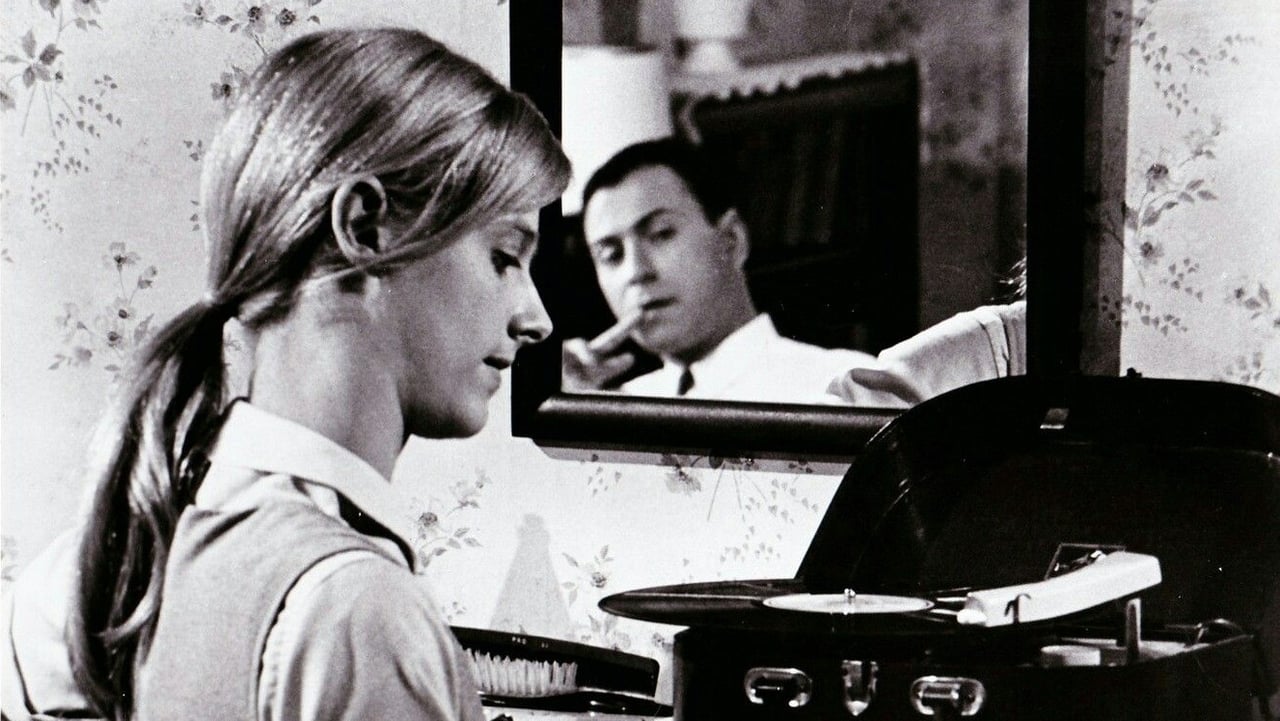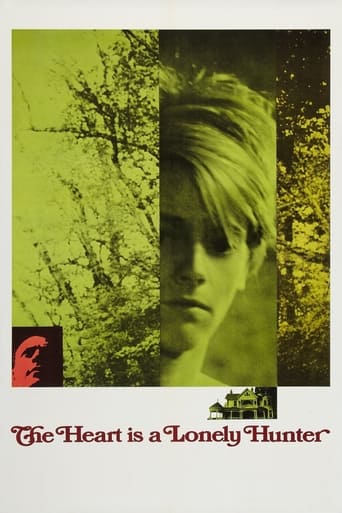Libramedi
Intense, gripping, stylish and poignant
Smartorhypo
Highly Overrated But Still Good
Maidexpl
Entertaining from beginning to end, it maintains the spirit of the franchise while establishing it's own seal with a fun cast
Taha Avalos
The best films of this genre always show a path and provide a takeaway for being a better person.
secondtake
The Heart is a Lonely Hunter (1968) A Carson McCullers drama (she wrote the original book) with the usual array of gritty Southern types who are cast quite well. The director is the utterly unknown Robert Ellis Miller, and there are many times that I feel that the potential here, which is pretty deep, goes unexplored. The photography by James Wong Howe toward the end of his career is professional through and through, if somewhat routine for New Hollywood.
Look for standout performances by Alan Arkin (as a lonely deaf-mute with a big heart) and Sondra Locke, later famous for many roles in Clint Eastwood films (with whom she was involved). An honesty of acting, and underacting, by these two (even by Locke, whose role is extroverted) hold the whole thing together, as undercurrents become the real meaning.
This is more of a drama than a soap opera. I say this because there is a McCullers kind of interest in "characters" and "losers," people who are troubled and eccentric. But there is also an interpersonal drive to the subplots (as with Locke's character's family, a kind of caricatured struggling poor southern family with a father in a wheelchair) that has the potential to become interesting as soap.
These two aspects are a bit at odds (they never jive), but a third aspect enters the plot and grows and grows, and it is the real reason to watch the movie and admire it: the intersection of black and white southern life. In a way that had become possible finally by the late 60s, Hollywood could deal with African-American life in an honest, believable way. The black doctor and his dilemma of appearing "uppity" if he treats a white man (a drunk) is only the beginning.
Arkin's deaf-mute character is compelling. He's troubled, too, but has perception and persistence. He sees love more than feels it, it seems, but he has deep caring (which is a different kind of love). And that wins the movie. Look for great side performances by the doctor's daughter played by Cicely Tyson (who had many great roles after this, such as in "Sounder" and who was married to Miles Davis) and by the doctor, played by Percy Rodriguez. A moving drama that is a small, but important, cog in the breakdown of prejudice in the 1960s.
tommayk
I first watched this movie as a teenager and thought it was terrific. Now, at 62, I wonder what I saw in it. It is so poorly directed that it does not surprise that I have never heard of Robert Ellis Miller except for this film. He does not know how to get the most out of a scene, not even with extremely talented actors standing before him.Of course, this is not his fault entirely. The screenplay is unfocused with clumsy dialog and crowded with people who fail to mesh. The Percy Rodrigues character is particularly heavy-handed. The central relationship between Alan Arkin and Sondra Locke is never really established so that the stakes are virtually non-existent and the dramatic ending is less powerful and moving than simply curious and baffling.It troubles that such a well-intended endeavor should fall so far short of its objectives. Although I have never read Ms. McCullers' book, her work is familiar to me and I am certain her story would have benefited from more responsible planning.The cast can hardly be faulted. Arkin and Locke clearly earned their Oscar nominations for outstanding work, and Chuck McCann probably deserved one too. Arkin especially dominates, pulling more from his part with less to say than a multitude of more audible performers. He is miraculously eloquent. Cicely Tyson and Stacy Keach are also excellent, often rising above the indulgent lines the are given, in portrayals which suggest what lay ahead for them both.If everyone involved on this project had been as conscientious as these actors, the result would have undoubtedly been an infinitely richer achievement.
dougdoepke
A deaf mute comes to a Southern town, touching the lives of those he meets.Singer is something of a mystery man. We know little about him, where he comes from, who's in his past, or what his attachments are, (except for the simple-minded Spiros and the fact that he's an engraver). In that sense, he's more like an idea than a man, maybe one of those mythical western heroes of the past. But instead of a six-gun to right wrongs, he communicates goodness in odd mute fashion, something like a silent universal conscience. That is, of course, until the end when we're reminded that he was more than an idea, after all. But the movie's real dramatic center is young Mick (Locke) trying to find herself amidst stifling surroundings. That scene of her sitting alone on the concert hall stairs, transfixed by the strains of Mozart is a sublime moment lifted by both the great music and Singer's mutely understanding gaze. In a sense, I think, he's been hearing those same sublime chords for some time, despite the physical deafness. Later, when the two communicate wordlessly with the recording, Mick enters a liberating world she will only come to appreciate graveside. And it's not surprising that a triggering event would come from her thoughtlessly brushing him and his music aside following a romantic interlude with her first boyfriend.But Singer's impact is not limited to the personal. His wordless ability also crosses racial lines as portrayed in getting an embittered Dr. Copeland to get beyond his prejudices. Again Singer opens up a better world, this time for the doctor, by using a different language, i.e. signing, in order to communicate with one of the doctor's deaf and dumb patients. As a result, the proud black man bends toward the goodness that Singer communicates. And, by doing so, he establishes the means for reconciling with his estranged daughter and son-in-law. The scenes of their reconciliation are among the most touching of the film.Frankly, I didn't know whether to laugh or cry at the rotund Spiros (McCann) gobbling down the goodies like there's no tomorrow. That he's also simple-minded, of course, lends these scenes their peculiar pathos. He's Singer's one conversational partner, and watching them rapid fire their signing puts the audience on the outside, for a change. Whether intentional or not, it's a shrewd move to make us experience something of what Singer routinely experiences in being closed out of normal conversations.These are the three main vignettes making up the movie. In each case, the other person experiences a sense of isolation and loneliness that can only be bridged by opening up through communication; and, as the movie shows, there are many such languages for bridging the gap. And though Stacy Keach's down-and-out drifter is given less screen time, when he looks longingly through the windowpane at others enjoying themselves in the diner, his isolation speaks volumes.Of course, the central irony occurs at the end, when Singer too finds himself alone now that the others no longer need him. He who has built so many bridges to others is thrust back to his own island. Bridges, we find out, are no good unless they go somewhere, and now, for the silent Singer, they don't.The cast is uniformly excellent, especially the big-eyed Locke, whose skinny, almost-pretty teen-ager looks totally unlike the Sandra Dee's, Annette Funicello's, of the time. It's that, plus the fact she seems totally unselfconscious in a really difficult role. Arkin's also effective, as the mute Singer. Still, I hope they weren't paying him by the word. And even though he had no dialog to learn, he did have segments of sign language to master, no easy task, I'm sure. Add to them the leonine Percy Rodrigues, an impressively strong and dignified presence, and it's an apt cast both visually and artistically.The movie is a superb adaptation from a Carson McCullers novel. I'd be surprised if its downbeat subject matter made any money. Still, the movie deals powerfully with a common experience in such a way that makes us contemplate what some folks call the human condition. And that's a noble achievement for any movie.
denscul
This film is powerful, sensitive, meaningful and memorable once you watch it. I have it on tape, and usually if I get to pick a film, I pick one that makes me laugh, not one that tells me a story about real life. At my age, I don't need that. Carson Mc Cullers as a writer can find the depths of a character's soul, and the film captures most of her talent. If you are looking for a remarkable film, this is one of the best. But I would suggest that the best place to find something serious can be found in a novel, written by an artist and not a hack turning out pulp fiction. A film unfortunately is restricted to roughly two hours, and thus at best can only be a short story. A single short story, to my knowledge has never won a noble prize for literature. The cinema has an art advantage no other art form has, except for the restriction of time limited to the limits of the human body to sit for more than two hours. A book, you can always put down, and return at your leisure.

